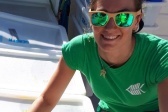

Mikaela Nordborg
m.nordborg2@aims.gov.au
Recipient of an AIMS@JCU Scholarship
PhD
College of Science and Engineering

Mikaela Nordborg
m.nordborg2@aims.gov.au
PhD
College of Science and Engineering
Petroleum hydrocarbon ecotoxicology for coral reef risk assessments
Dr Mikaela Nordborg is a Swedish-Australian marine ecologist and ecotoxicologist with a background in climate change physiology. Mikaela completed her PhD through the AIMS@JCU collaborative research program and her Doctor of Philosophy was conferred in 2022. She completed her BSc at the University of Gothenburg (UoG), Sweden, in 2011 producing a Bachelor thesis on the effects of projected future temperature and pH on the calcium content of eggs and larvae of a temperate lobster. As a part of her MSc she undertook coursework at UoG, focusing on marine monitoring and organic chemistry, and the University of New South Wales, Australia, focusing on quantitative marine science methods and Australian marine science. She completed her MSc at UoG through a collaborative research project with the Australian Institute of Marine Science (AIMS), Townsville, investigating the phototoxic effects of ultraviolet radiation and petroleum hydrocarbons on larval settlement of Acroporid corals. Additionally, she has extensive experience as a coral spawning technician, supporting researchers at AIMS throughout the coral spawning experimental period, as well as from the recreational diving industry.
Petroleum hydrocarbon ecotoxicology for coral reef risk assessments
2017 to 2021
Project Description
The main aims of the project were to: (i) identify which coral life stages are most sensitive to petroleum hydrocarbon pollution using the model coral species Acropora millepora; (ii) identify tropical environmental co-factors which may affect oil toxicity through a review of the current tropical oil toxicity literature; (iii) experimentally investigate the impacts of key environmental co-factors on oil toxicity towards each investigated coral life stage; and (iv) derive a species-specific sensitivity constant for an ecologically relevant endpoint in the most sensitive life stage, and validate its use in predictive oil toxicity modelling using the target lipid model.
Project Importance
The predicted increases in commercial shipping in tropical Australian marine environments, along with continued oil and gas extraction activities, increases the likelihood of petroleum hydrocarbon spills near Australian coral reefs. Additionally, projected future climate change means that effective management of reefs will rely on a detailed understanding of the effects of both individual local and global pressures and the potential interactions between multiple pressures. However, the currently available information on the effects of petroleum hydrocarbon pollution on coral reef organisms is limited. For example, several life stages of reef-building corals remained unstudied prior to the completion of this PhD project. Additionally, only a handful of previous studies had included ecologically relevant environmental co-factors which are important in quantifying the hazard posed by oil pollution today (e.g. ultraviolet radiation). This project substantially increased the available information on the effects of petroleum hydrocarbons on reef-building corals, and will enable the use of more ecologically relevant information on the impacts of oil pollutants towards coral reef environments in risk assessments as well as focus future research efforts.
Project Methods
The project used ecotoxicological approaches and methods to investigate the sensitivities of key life stages of the model coral species Acropora millepora to a commonly used heavy fuel oil under environmentally relevant light conditions. Treatment parameters for experiments (e.g. pollutant concentration and light intensity) were monitored in accordance with best practices for petroleum hydrocarbon and cumulative impacts research. Sensitivity data was used to derive toxic threshold values (e.g. effect- and lethal concentrations) for both lethal and sublethal endpoints for each individual life stage, and used cutting edge statistical methods to perform the concentration-response analysis as well as sensitivity comparisons. After identifying the life stage and endpoint which was most sensitive to short-term exposure to oil pollutants additional experimental work was undertaken using exposures to single aromatic hydrocarbons commonly found in oil to derive a species-specific sensitivity constant for Acropora millepora. The experimental results from the life stage comparisons were then used to evaluate the protectiveness of threshold values predicted using the target lipid model, as well as its phototoxic extension, based on the measured composition of the heavy fuel oil water accommodated fractions used in earlier experiments.
Project Results
The results of this project highlights that tropical environmental conditions such as ultraviolet radiation (UVR) and elevated temperature can affect oil toxicity, but that very few tropical oil toxicity studies have included such environmental co-factors to date (Nordborg et al. 2020, https://doi.org/10.1016/j.scitotenv.2020.137486); that both pre- and post settlement life stages of the commonly occurring Indo-Pacific coral Acropora millepora are highly sensitive to oil exposure (Nordborg et al. 2021, https://doi.org/10.1016/j.scitotenv.2021.146676; Nordborg et al. 2022, https://doi.org/10.1016/j.envpol.2022.119799); that these early life stages of coral may be equally, or more, sensitive than previously studied aquatic species (Nordborg et al. 2022, https://doi.org/10.1016/j.envpol.2022.119799); and that even low intensity UVR can significantly increase the toxicity of oil pollutants towards A. millepora.
Keywords
Modelling,
Pollution